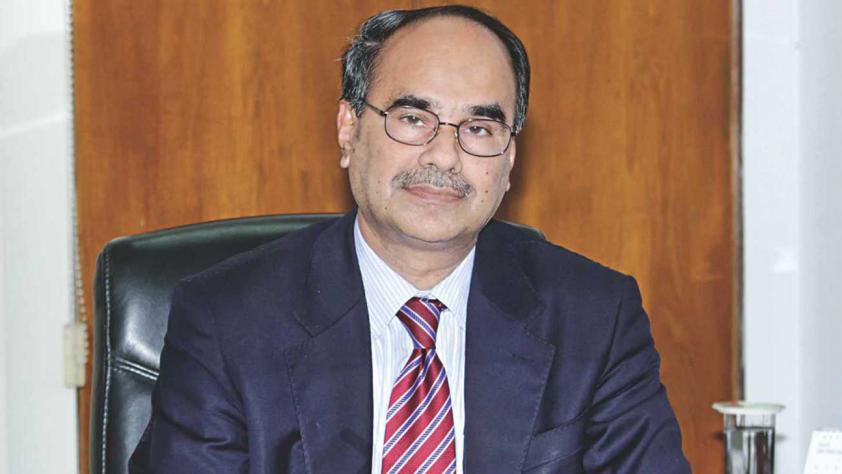Banks asked not to force female staff to stay at office after 6pm
They must pay female staff for working overtime in case of emergency
 Two female officials of a state-owned bank are seen at a branch of the bank in the capital recently. Bangladesh Bank on Tuesday asked the scheduled banks to improve working conditions for their female staff.
Two female officials of a state-owned bank are seen at a branch of the bank in the capital recently. Bangladesh Bank on Tuesday asked the scheduled banks to improve working conditions for their female staff.
The central bank on Tuesday asked the scheduled banks to improve working conditions for their female staff, ensuring that they are not held back at the office after 6pm, and if, for any emergency, they are detained beyond the usual office hours they must be paid overtime allowance. The BB asked the banks not to force the female staff to stay after closing the daily work of the branches at 6pm under any circumstances, considering their security. The banks have to issue internal circular in this regard as soon as possible, according to the central bank directives. A BB official told New Age on Tuesday that the central bank had taken the decisions at a quarterly meeting of the bankers held on April 30 at the BB headquarters in the capital. The BB sent the minutes of the bankers’ meeting to managing directors and chief executive officers of all banks on Tuesday attaching the directives about the female staff to ensure their security and protect them against gender harassment, he said. After receiving the minutes of the bankers’ meeting, the managements of the banks have to issue internal circular to implement the directives. The banks have to pay overtime allowances to their female staff if any one of them has to stay back at the branch due to special necessity of the bank after 6pm, the BB directives said. The central bank found allegations that female officials of the banks were facing gender harassment as managements of the banks detained them till 7pm to 8pm after closing the daily work of the branches, often without any valid reasons, the BB official said. The female staff of the banks suffer from a lack of security when they go home in the evening due to their overtime duty, he pointed out. The central bank in its directives also advised the banks to close their branches at 6pm to save the electricity which would also give relief to the male staff from unnecessary overtime duty. The BB officials warned that the central bank would take punitive measures against the banks if they put extra pressure on their female officials. The central bank also asked the banks to recruit more female staff by developing the work environment for women, according to the directives. The banks have been asked to take measures to appoint at least one female staff as deputy managing director. The BB also asked the banks not to impose extra pressure on their officials to collect deposits from the clients. The clients are deprived of getting adequate services from the banks as the officers are busy to collect deposits to increase the banks’ profit, the BB minutes of the bankers’ meeting said. Unhealthy competition among the banks has increased in recent times with proliferation of new banks in the private sector and there has been a rat race among banks to collect more deposits from the clients by imposing extra-burden on their officials. The BB asked the banks not to give excess target to their officials to collect deposits, the central bank officials said.
News:New Age/20-May-2015Mutual Trust Bank Limited (MTB)
 Mutual Trust Bank Limited (MTB) recently signed an agreement with Galaxy Healthcare Services at MTB Centre, the bank's Corporate Head Office in Gulshan, Dhaka. Under this agreement, all MTB Privilege customers will enjoy specialized healthcare facilities in Singapore, India and Malaysia.
Mutual Trust Bank Limited (MTB) recently signed an agreement with Galaxy Healthcare Services at MTB Centre, the bank's Corporate Head Office in Gulshan, Dhaka. Under this agreement, all MTB Privilege customers will enjoy specialized healthcare facilities in Singapore, India and Malaysia.
Top brokers seek BB intervention
Raihan M Chowdhury and Mohammad Mufazzal

Top brokers have sought the central bank's intervention and finance minister in two core areas of bank's investments in the capital market to help stabilise the markets, officials said.
In this regard, the brokers urged both the bourses to put forward their demand to the Bangladesh Bank (BB) and the finance minister.
The representatives of top brokers Monday held a meeting with the chairman of the Chittagong Stock Exchange (CSE) Dr Muhammad Abdul Mazid and submitted two proposals.
In their proposals, the brokers have sought the extension of timeframe for adjusting banks' over exposure up to December 31, 2020 from existing deadline set on July 21, 2016.
"There are not adequate depth in the market that can absorb sell pressures worth between BDT 60.0 billion-70.0 billion (6000- 7000 crore) resulting from forced sale/ liquidation of the 'so-called' excess exposure of banks. The deadline, therefore, should be extended at least up to 31st December, 2020," one of the sources was quoted after the meeting.
Another proposal is to exclude banks' equity investments made in subsidiary companies and the investments made in non-listed securities from the bank's exposure limit set at 25 per cent of eligible capital.
The brokers recently submitted same proposals to Dhaka Stock Exchange (DSE) and sought its help in convincing the central bank.
"At Monday's meeting we have been requested to submit the brokers' proposals to the central bank and finance minister. After scrutinising the proposals we will submit these on behalf of the brokers," said Mr. Mazid, the chairman of the CSE.
The managing director of a leading brokerage firm said proper coordination of regulatory bodies is not reflected in the capital market.
"We hope the market will be stabilised if our demands are fulfilled through proper coordination of the regulatory bodies," said the managing director who also attended the Monday's meeting.
At the meeting, the representatives of Al-Arafa Islami Bank, EBL Securities, International Leasing, MTB Securities, NCC Bank Securities and IDLC securities were present.
The meeting was told that BB in 2010 took several measures within a very short time for controlling the 'high tide' of the stock market and instant implementation of those directives adversely affected the stock market.
According to market insiders, as per the Bank Company Act 1991, Banks/NBFIs were allowed to invest 10 per cent of their total liabilities in the stock market. But due to lack of proper monitoring on the part of BB, many banks invested as much as 40 per cent of their total liabilities in the stock market in 2010.
Later in 2013, by amending the Bank Company Act, the allowable investment in stock market was set at 25 per cent of 'eligible' capital (Paid-Up Capital, Share Premium, Statutory Reserve and Retained Earnings).
Market insiders pointed out that due to the amendment, a bank which invested BDT 10.0 billion (1000 crore) in 2010 can now invest only BDT 2.50 billion (250 crore) to BDT 3.0 billion (300 crore) in the stock market.
This amendment has completely stopped stock market participation of banks and also they are under constant pressure from BB to sell-off their shares (even at loss) further deteriorating the market conditions.
The meeting was further told that exposure in stock market is calculated by using all types of securities/ shares (Private, Public, Redeemable Preference and Non-Listed). Only the listed stocks should be treated as exposure because it is not logical to include non-listed companies for calculating the 'capital market' exposure as they are not listed in the stock exchanges.
As per the new rules, banks are directed to reduce their exposure and liquidate excess exposure within 21st July 2016 which created heavy sell pressure in the stock market.
"Initially BB circulars said (DOS circular # 4, in 2010 and DOS circular # 4 in the year 2011) that the subsidiaries' capital will not be considered as capital market exposure of banks. But now Bangladesh Bank includes the subsidiaries' capital as capital market exposure of banks which is contradictory to BB's own circulars," an executive of another top brokerage house said.
On capital market exposure, the meeting was told that the exposure should be calculated on the basis of listed securities in stock exchanges only.
"Companies which are not listed in stock exchanges should be kept out from the exposure calculation," the proposals demanded.
Police handed over the Gold seized in Ctg to Bangladesh Bank

NCC Bank aspires to be at the top
 Golam Hafiz Ahmed
Golam Hafiz Ahmed
Customer satisfaction, financial inclusion and management excellence will be at the heart of NCC Bank's efforts as it aspires to become one of the most beloved commercial banks in four years, its chief executive officer said.
“The environment within the branches will be more customer-friendly in paper work, delivery and care, so they feel comfortable banking with us,” said Golam Hafiz Ahmed.
To make the bank pro-customers, he said, NCC Bank is focusing on building positivity in the attitudes of the frontline workforce.
“If we can satisfy our customers, it will ultimately bring in more clients for the bank.”
To accomplish this goal, NCC Bank has recruited young, talented officers under a new pay scale, which was adopted last year to keep benefits on par with the industry, Ahmed told The Daily Star in an interview last week.
The bank is mapping out a five-year strategy with expansion of the balance sheet and operations, financial inclusion and excellence in total management topping the list of goals, the CEO said.
“We will bring qualitative changes in everything we do. It will eventually increase customer benefit, experience and satisfaction, employees' satisfaction and shareholders' value.”
As a first step, the bank is working on upgrading the system that is needed for large scale operations, he said. It is also working on workforce realignment, he added. “Our plan is to become a top financial institution by 2019.”
Currently, the journey of the bank, now a well-positioned financial institution, to reach a sound position was not smooth at all. Its predecessor was an investment company, riddled with problems. When it became a bank in 1993, it still carried its past ailments.
Owing to dedication from the board, it was able to shed all its past problems in seven years.
“We did not improve overnight. We are still trying to bring in more quality in services and management,” said Ahmed.
The bank's deposits and loans and advancements are growing gradually. In 2014, it had a deposit base of Tk 10,570 crore, up 7.61 percent from 2013 when it was Tk 9,822 crore. Its loans grew to Tk 9,092 crore from Tk 8,816 crore in the same time.
Its non-performing loans went up in the last three years following very low levels of NPLs in 2010 and 2011, when it was 2.27 percent and 2.68 percent respectively.
As of last year, it had NPLs of Tk 673 crore, which was 7.49 percent of total loans. Last year, the bank recorded a profit of Tk 150 crore, which was Tk 113 crore a year ago.
Ahmed pointed at default loans as the biggest hurdle for old banks in the country. “Because of this constraint, we struggle to bring down the lending rates.”
The NPLs for NCC Bank went up a bit this year from last year because of the overall troubled business scenario in the country, which has hit almost all banks, said Ahmed.
He, however, said the bank would reach a comfortable level within two years in terms of NPL, as the bank has an annual target in either recovery or rescheduling worth Tk 300 crore.
With greater focus on tightening risk management, recovering old loans and regularising old accounts, it could not pay attention to propelling the business for higher growth, said the CEO.
“Still, the bank has forayed into new areas for business. And the quality of operational performance and total management has improved, which will be reflected in the financial results at the end of this year.”
Customers are borrowing from other sources as well as external sources at much lower interest rates, he said. “We have to bring down lending rates for the good customers. Of course, we have been doing so all along, providing very competitive rates to good companies.”
The bank has reduced the interest rate for short-term financing and branding itself anew with new products.
With an eye on small and medium enterprises, Ahmed said, “We did not earn very much from our large clients, but our growth in the SME sector is very encouraging. We have exceeded our lending targets for the sector.”
The bank is also involved in agriculture lending and green banking in line with instructions from the central bank, he said. “We are also doing direct lending in the agriculture sector in many districts. Our experience in direct agriculture lending is also good. We have a good base of farmer-borrowers.”
The bank has approved a number of projects under its green banking initiative, as it believes in responsible lending, keeping in mind the environmental impacts and social benefits of lending.
On channelling remittance into the country, it helped migrant workers send Tk 1,870 crore to the country last year.
The bank now has 104 branches employing 2,277 people, and has received permission from the central bank to open another six branches this year.
He said NCC Bank has not gone for the relaxed loan rescheduling facility offered by the central bank; as a lesson from financial felonies in a number of state-run banks in recent years, it has solidified its risk management system.
Ahmed, who is in banking for 31 years now, welcomed the government's decision to reduce the interest rates on its savings instruments; the banks were unable to woo depositors because of the gap in rates between the bank deposit rates and government's savings certificates.
“The new decision will ensure a level playing field.”
Ahmed, who studied economics at Dhaka University, began his career as a senior officer with Pubali Bank in 1983. With just six months, he joined France's Banque Indosuez's Dhaka office where he worked for 13 years. He also worked for Dhaka Bank until he moved to NCC Bank in January 2008 as its deputy managing director. He was appointed as its CEO in February last year.
News:The Daily Star/19-May-2015


